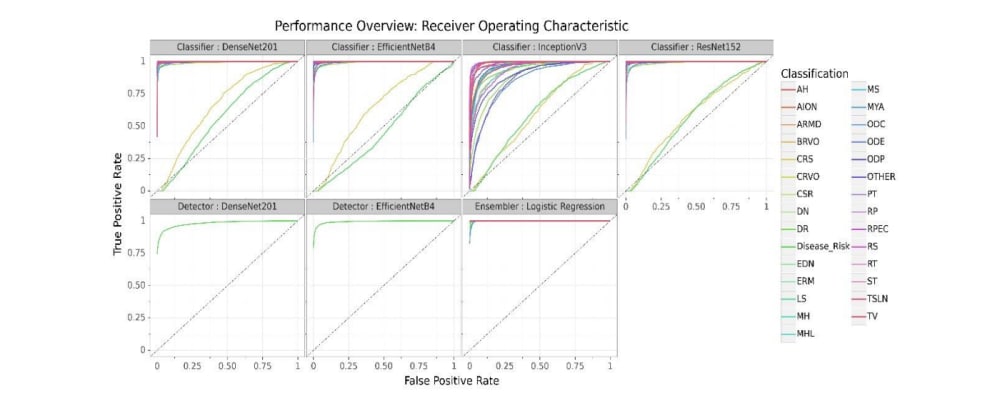This project presents a comprehensive system for predicting retinal diseases from fundus images using deep learning, particularly the InceptionV3 model, fine-tuned on a curated dataset. It also evaluates the risk of heart failure based on specific retinal disease predictions. Implemented as a Flask web application, it allows users to upload retinal images and receive predictions along with explanations of potential heart failure risks. The dataset is processed with images resized and augmented to improve model performance.
The dataset used for training the model is managed using a CSV interface that stores image paths and associated labels, with one-hot encoding applied to the labels. To ensure robust performance evaluation, the dataset is divided using k-fold cross-validation. Images are resized to a uniform input shape of 224x224 pixels, and data augmentation techniques are employed to enhance model generalization.
The InceptionV3 architecture was chosen due to its proven efficacy in image classification tasks. The model is trained using a custom multilabel focal loss function to address class imbalance, with class weights computed to further enhance accuracy. Performance is monitored through metrics such as binary accuracy and AUC (Area Under the Curve), and training efficiency is improved through the use of callbacks. The web application preprocesses uploaded images, feeds them into the trained model, and displays top predictions with explanations. The system demonstrates high accuracy in predicting retinal diseases and offers valuable insights into potential heart failure risks, providing a practical tool for early diagnosis and preventive healthcare. Future enhancements could involve expanding the dataset, adding more retinal conditions, improving model interpretability, and validating the system in clinical settings.
Deep Learning-Based Diagnosis: Leveraging state-of-the-art deep learning algorithms, particularly convolutional neural networks (CNNs), to analyze retinal images and accurately diagnose various retinal diseases. Incorporating both retinal and cardiovascular health assessments to provide holistic health evaluations, identifying potential correlations between retinal conditions and cardiovascular risk factors.
Transfer Learning for Enhanced Accuracy: Employing transfer learning techniques to fine-tune pre-trained CNN models on retinal datasets, enabling faster model convergence and improving diagnostic accuracy, especially in scenarios with limited labeled data. Developing an intuitive web application interface for easy accessibility and utilization of the diagnostic system, allowing users to upload retinal images, conduct automated analyses, and visualize diagnostic results seamlessly.
Ethical Data Handling: Ensuring adherence to ethical principles and guidelines in data handling, model development, and deployment, including robust patient data privacy measures and transparency in model decision-making. Providing comprehensive assessments of retinal diseases and their potential implications for cardiovascular health, facilitating early intervention and personalized patient care. Incorporating interactive visualization tools within the web application interface to enhance user engagement and facilitate a deeper understanding of diagnostic results.
Like this entry?
-
About the Entrant
- Name:Samitha A
- Type of entry:teamTeam members:
- Samitha A
- Keerthana R
- Veveethan AK
- Saravana Kumar S
- Patent status:none


